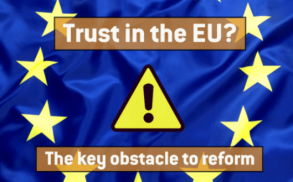This is a follow-up post to High and Mighty and provides in one place a collection of links to our previous posts on the theme of the EU’s often-displayed contempt for its citizens.
Our previous post introduced a theme we have found ourselves repeating again and again: The EU consistently displays disdain for the opinions and preferences of the common man and woman in the street, or field, on the bus and even via his or her elected representative in a national parliament. A list of relevant links, offering further comments and evidence, is given after each group below.
- Foundations
 The EU remains fixated on its progress towards ruling its member states as a supra-national government. This in turn is based on the EU’s contempt for nations, their governments and their citizens, which goes back to the foundations of the Union and its predecessor organisations. [1]
The EU remains fixated on its progress towards ruling its member states as a supra-national government. This in turn is based on the EU’s contempt for nations, their governments and their citizens, which goes back to the foundations of the Union and its predecessor organisations. [1]
We have shown throughout this blog that the EU’s ideology of supra-national government, growing as it does out of disregard for democracy and coupled with a culture of deceit to disguise where they are heading, is bound to lead to discontent and disenchantment. [2]
Even if it were possible to implement reform, for example as proposed by the European Commission in its White Paper on the future of the Union (see our Commentary on that paper), such reforms would be equivalent to pruning the tree when the problem is in the roots, the underlying federalist ideology which scorns real democracy. [3] The EU is an oligarchic regime disguised by its claimed high moral purpose.
Two quotations offer evidence that supports our claim that the EU is founded on contempt for its member nations and disdain for its citizens.
“Europe’s nations should be guided towards the superstate without their people understanding what is happening. This can be accomplished by successive steps, each disguised as having an economic purpose, but which will eventually and irreversibly lead to federation.” (attributed to Jean Monnet.)
I have never understood why public opinion about European ideas should be taken into account.” Attributed to Raymond Barre, former French premier and European commissioner.
These quotations characterise the attitude that underpins the whole European Union project. The edifice is a castle built on the sands of elitist disdain for the peoples of Europe and their (more-or-less) democratic national regimes. [4]
The single European currency was introduced from 1999 with a view to giving the European Central Bank (ECB) authority over monetary policy. It was said, and hoped “that the monetary union would be a locomotive that would pull Europe toward an ever more perfect political union.” [5] This is the main message underlying the Five Presidents Report from 2015. The peoples of Europe were not consulted; many preferred their franks, marks and kroner for their heritage and security, though maybe some signed up because their continually devaluing lira, pesetas and drachmas would be replaced by something stronger (they may be regretting it now).
The EU is founded on two conceptual pillars:
A: contempt for the inability of the nation states of Europe to bring and maintain peace, stability and prosperity to the peoples of Europe;
B: disdain for the inability of the peoples of Europe to choose their national governments wisely.
It is notable that both pillars are expressed as negatives (contempt and disdain). It should not surprise us that the federal architecture built on these pillars is unstable. [6]
Most EU failures result from the root flaw in the Project: that it is founded on an ideology that drives an unaccountable, undemocratic body, with no reference to the will of the people. [7]
Links: (1) Carry on Macron, (2) View from the Parapet, (3) Influence or Impotence?, (4) Attitudes and Ideology, (5) The European Project: Some History, (6) Foundations, (7) Benefits of the EU Project
- Citizens and Voters
 The EU ‘panjandrums’ are so focused on their ideology, and detached from the views of ordinary people that they cannot see why anyone should object to their plans; or, if anyone does object, why they should take any notice. [1]
The EU ‘panjandrums’ are so focused on their ideology, and detached from the views of ordinary people that they cannot see why anyone should object to their plans; or, if anyone does object, why they should take any notice. [1]
We can be sure that efforts to persuade the EU to engage its citizens in proposed ‘consultations’ would not bring about improvements in any sense that we would understand, for example introducing a way to get rid of a government. [2] The EU is not willing to give serious consideration to the view that it is not a democratic form of governance and the contempt it displays by using propaganda to cover the deficit will surely be a significant factor leading to its demise.
“Europe can only work if we all work for unity and commonality … Only then will leaders of the EU institutions and national governments be able to regain the trust of Europe’s citizens in our common project … What our citizens need much more is that someone governs.” (Jean-Claude Juncker in his 2016 State of the Union address) [3]
We can translate this to mean that we all need to buckle down to the ideology and accept being governed from above and not expect to change that. Not many of us will believe that working for unity and commonality will be sufficient to “regain the trust of Europe’s citizens” in the EU.
As for “someone governs”, that rips through the veil to reveal the naked truth, that Juncker (and his like) want to govern us all, forever, without recall. At least he doesn’t pretend that this is what we want, just that it’s what we need (and therefore should want).
The Economist said that the Referendum vote “was won by cynically pandering to voters’ insular instincts“. This disparages not only the sound arguments that were put forward in support of Brexit but also, and more revealingly, it sneers at the dumb voters whose insular instincts led them to vote the wrong way. [4]
The EU project is based on its rejection of the capabilities of national governments and on its disdain for the inability of voters to elect capable national governments, let alone an international one. [5]
Links: (1) EU Easing Up – Really?, (2) Macron the Munificent, (3) Attitudes and Ideology, (4) Remainers Moaning, (5) Evidence of Fragility (Part 5),
- UK elites
Despite a few concessions and ‘Project Fear’, the British government failed to keep the electorate in line. It is surprising that EU and other leaders are so disdainful of citizens that they are prepared to ignore widespread discontent and continue to push the line that leaving will hurt, while failing to offer convincing reasons to love the project. Many citizens fail to see the supposed benefits of membership and while our leaders neglect this failure the EU project will remain at risk. [1]
 Why and how have reasonably honourable people, including previous UK Prime Ministers, deceived us into first joining and then asking us to remain in the EU? It is because they are patricians who believe they are acting for our good, in spite of our weak minds. British politicians are not immune to this disdainful attitude:
Why and how have reasonably honourable people, including previous UK Prime Ministers, deceived us into first joining and then asking us to remain in the EU? It is because they are patricians who believe they are acting for our good, in spite of our weak minds. British politicians are not immune to this disdainful attitude:
“The British people must be led slowly and unconsciously into the abandonment of their traditional economic defences, not asked.” Peter Thorneycroft, former UK government minister. [2]
An Associate Professor of Modern History in the University of Oxford chose to denigrate the UK’s democracy, perhaps because a majority of referendum voters chose the ‘wrong’ option. He is not alone in questioning the value of democracy when people vote the wrong way; this is frequent in the EU, which has established a reputation for over-riding the views of its citizens. Nor is he alone among academics in straying outside his discipline to use his authority to present his opinions as facts. [3]
Links: (1) French Election, (2) Attitudes and Ideology, (3) Pontificating Professors
- Deceptions
 “THE KEY FACTS”, offered us by the pre-referendum UK government’s leaflet, were not facts at all, merely ‘alternative facts’ as we have since come to know them. The government treated us like idiots but a majority voted against them anyway. [1]
“THE KEY FACTS”, offered us by the pre-referendum UK government’s leaflet, were not facts at all, merely ‘alternative facts’ as we have since come to know them. The government treated us like idiots but a majority voted against them anyway. [1]
“The people didn’t vote to be poorer” continues the deception, and the disdain for citizens that is clearly manifest in it. They aren’t truly interested in what we did vote for – and against. [1]
Most evident to us is the underlying sense of superiority that enables, and encourages, EU leaders and their peers to mislead us. We pick out one example, among many available, to illustrate the deceit. “Europe has always been an attractive place to do business.” (Jean-Claude Juncker) This sort of remark slips so smoothly past the critical faculties of so many among us that we don’t think about it but just swallow it. Propaganda is usually required to promote something that has little substance or value but in this case it is needed to disguise the true agenda, and lack of achievement, of the European Union. [2]
Links: (1) For Richer or Poorer? (2) State of the Union 2017
- Intra-EU
A largely pro-EU website (https://www.debatingeurope.eu/focus/infobox-arguments-for-and-against-fiscal-union/#.W6ruUBMzYUE), gives a clear and honest description of the true agenda, a Northern invention, and its inbuilt disdain for Southern member states.
“A European fiscal union, with proper institutions would be able to provide joined-up management of the EU economy as a whole. Ex-ante control would mean that wayward Irish, Spaniards or Greeks would not be able to recklessly inflate property bubbles or cook their budget books.” [1]
 The Project often seems like an imposition on “wayward” nations; which may now include Eastern European ones.
The Project often seems like an imposition on “wayward” nations; which may now include Eastern European ones.
“In 2011, the E.C.B. reduced its buying of Italian bonds. This led to the fracture of Silvio Berlusconi’s coalition, forcing the transcendently irresponsible prime minister out of office. The ability of the central bank to, in effect, fire a sitting head of government rebuts the gripe that the European Union is hobbled by a lack of clout.” (Strobe Talbot in The New York Times) [2]
We wonder who gripes that the EU lacks clout. Its willingness, and ability, to intervene in the workings of real (if flawed) democracies while not being subject to democratic accountability demonstrates not only clout but the true agenda of the Project.
“It is our collective will that will drive Europe forward. Like the generations before us, we have Europe’s future in our own hands.” (from EU White Paper)
Always it’s “Europe”, as if that were nothing but the EU. This disdain for other Europeans echoes the disdain for electorates and gives the lie to the incessant claims that the project is concerned with the welfare of European citizens. Europe’s citizens are, to the mandarins, a nuisance that has to be managed in the interests of their pet project. [3]
We’ve seen all this very clearly for two years now, throughout the Brexit ‘negotiations’ and we don’t believe it will change, though there are signs that the language might be moderated. [4]
Links: (1) They think they can do better, (2) The European Project: Some History, (3) More on the White Paper, (4) Negotiations